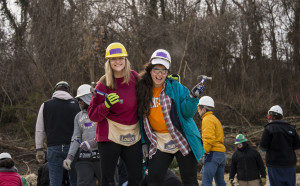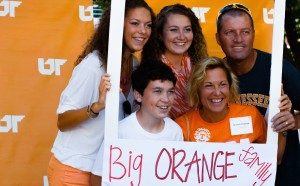 Student Learning Goals
Student Learning Goals
It is the objective of the Division of Student Life to facilitate student learning and development in the following eight areas, identified as our divisional student learning goals. This is accomplished through our programs, services, co-curricular programming, and overall student support as well as through intentional interaction and collaboration with members of the UT community including faculty, staff, alumni, parents, and community representatives.
Each unit will not necessarily meet each student learning goal each year; however, as a division, we are committed to collaboratively reaching each of these goals through the creation of student learning outcomes. To create your unit’s student learning outcomes, consider the goals below. Your unit’s learning outcome statements should be specific and measurable.
Self-Knowledge
explore and clarify interests, skills, preferences and values • appraise oneself accurately • set personal, educational and career goals • exhibit self-confidence • define purpose • achieve sense of identity
Social Responsibility & Service
engage in active citizenship • demonstrate issues awareness, understanding and advocacy • challenge unjust or uncivil behaviors and standards • participate in service activities • make ethical decisions • identify as a member of global community
Communication
communicate effectively, verbally and nonverbally, in and out of the classroom • speak confidently in public • relay messages efficiently and suitably to the situation and audience • exhibit diplomacy, tact and negotiation skills • uphold a standard of confidentiality
Student Engagement
develop a sense of belonging, loyalty and institutional affinity • participate in campus and community groups • display responsibility to/for student organizations and relationships built on campus • possess dedication to the institution beyond graduation evidenced through gifts and campus contributions
Leadership
define leadership style or philosophy • work well in a team • delegate • serve as a role model • lead with integrity • develop meaningful interpersonal relationships • resolve conflict with civility • set and measure individual and group goals
Healthy Living
maintain or achieve emotional, personal, and physical wellness • understand the consequences of risky behavior on health and academic success • make decisions that promote safe, healthy behaviors and reduce risk • contribute to a healthy, sustainable campus and community
Intercultural Competence
demonstrate awareness, knowledge, and skills to understand the impact of diversity on campus and in the community • seek involvement with people different than oneself • practice fairness and equity • respect and appreciate diverse viewpoints and backgrounds
Practical Competence
identify and utilize campus resources • understand rights and responsibilities • strengthen problem solving, critical thinking, and life skills • manage time and finances • adapt to changing situations • apply gained knowledge
Program Goals 
It is the objective of the Division of Student Life to facilitate achievement and efficiency in the following six areas, identified as our divisional program goals. These goals are accomplished through our staff and programs as well as through intentional interaction and collaboration with members of the UT community including faculty, staff, alumni, parents, and community representatives. Program goals relate specifically to the operational and process side of each department’s purpose and should be aligned with the unit’s mission and address the overall impact that occurs on campus and in the community as a result of the unit’s activities.
Each unit will not necessarily meet each program goal each year; however, as a division we are committed to collaboratively reaching each of these goals through the creation of program outcomes. To create the unit’s program outcomes, consider critical work processes and how these should function. The statements should be specific and measurable.
Service Delivery
participation numbers • number of students and/or community members served • access figures
Revenue Generation
general revenue • external funding and sponsorships • development initiatives • grants
Facility Operation
major aspects of facilities and operations • capital projects • occupancy • registration data
Community Outreach
outreach • community service • volunteer hours
Staff Engagement
membership and involvement in professional associations • community service • conference participation • membership in local agencies • presentation and publication experience
Assessment & Accreditation
departmental assessment projects • program reviews • accreditation projects
